386 Search Results for complex communication
April 4, 2019
by Carole Zangari -
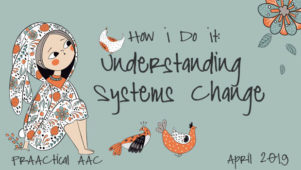
Have you ever dreamed of taking a detour in your AAC work to address the needs from a totally different direction? Special educator Sarah Mueller did just that. Follow along as she tells us about her journey from teacher to student. :::::::::::::::::::::::::::::::::::::::::::::::::::::::::::::::::::::::::::::::::::::::::::::::::: “Autism isn’t something a person has or a ‘shell’ that a person is trapped inside. There’s no normal child hidden behind the autism. Autism is a way of being. It is pervasive; it colors every experience, every sensation, perception, thought, emotion, and encounter, every aspect of existence. It is not possible to separate the autism from the person – and if it were possible, the person you’d have left would not be the same person you started with. This is important, so take a moment to consider it: Autism is a way of being. It is not possible to separate the person from the autism.” – Jim Sinclair... [Read More...]
March 13, 2019
by Carole Zangari -
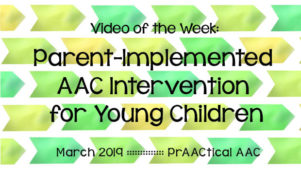
Over 100 young children with AAC needs and their parents participated in research to look at the ways that their communication changed when families were trained to provide support. For today’s featured video, we turn to the Edmonton Regional Learning Consortium (ERLC) and the Alberta Regional Professional Development Consortia (ARPDC) to learn more about what research teams led by Drs. Maryann Romski and Rose Sevick found out. Learn about the methods and strategies they used in this archived webinar. Many thanks to the ERLC. the ARPDC, and Drs. Romski and Sevcik for making Parent-Coached Augmented Language Intervention for Toddlers available. Direct Link to Video: https://www.youtube.com/watch?time_continue=373&v=rnILKJu_ai0
February 28, 2019
by Carole Zangari -

Every once in a while, we’re refreshing a blog post authored by the co-founder of PrAACtical AAC, the late Dr. Robin Parker, to share her clinical wisdom with those who may have missed it the first time around. Enjoy! ————————————————————————————— Behavior-It’s All about Perspective: Funny Time in the Funny Area A ‘funny area’ is not a technique or strategy you will see in a behavior or speech-language therapy textbook. But here is how we came to know and love ‘funny time’ & the ‘funny area’ A Little Background Tommy, a 9-year-old boy, seemed to be getting the ‘giggles’ each session. The graduate student clinician was not sure how to ‘control the situation’. Tommy typically worked hard using his SGD to build long and complex sentences for communication during natural age-appropriate activities (i.e., golf, art, and reading). But then the ‘giggles’ would start… and less and less communication was getting done.... [Read More...]
December 29, 2018
by Carole Zangari -
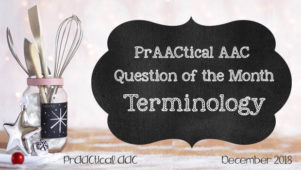
“What’s in a name? that which we call a rose By any other name would smell as sweet.” (W. Shakespeare) It has always irked me that a field which emerged to support individuals with communication challenges has such a long and complex name. Aug-men-ta-tive and al-ter-na-tive com-mu-ni-ca-tion can get a bit tiresome, particularly in writing. Recently, an AAC scholar asked us to get input on terminology from our PrAACtical AAC readers. Do you have an opinion about what terminology we should use when writing about AAC concepts, tools, and strategies in textbooks, journal articles, etc? Here’s your chance to weigh in. Loading…
November 1, 2018
by Carole Zangari -
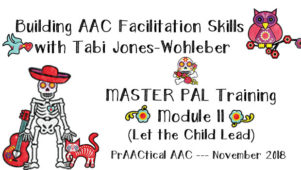
Today, Tabi Jones-Wohleber shares the last module in the MASTER PAL training series, which provides tips and strategies for working with children who don’t yet demonstrate joint attention. This module should take 30-40 minutes to present. Join us next week as we do a final wrap-up with suggestions on using this training series in your AAC work. ::::::::::::::::::::::::::::::::::::::::::::::::::::::::::::::::::::::::::::::::::::::::::::::::::::::::::::::: Model as a MASTER PAL Module 11: Let the Child Lead Facilitator Guidelines It can be really difficult to get communication started with a child who does not demonstrate joint attention. This module explores tips and strategies for traveling with a child on their journey from preoccupation with seeking sensory input/inattention to learning, engaging, and communicating. Because learning emerges from meaningful social emotional experiences, letting the child lead can go a long way toward being invited into their world. Then learning can happen! Here are some things you will need for this... [Read More...]
August 6, 2018
by Carole Zangari -
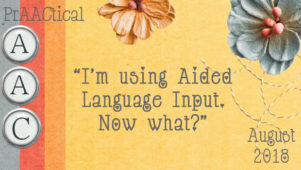
Children who grow up hearing Mandarin generally learn to speak Mandarin. Deaf children who grow up with parents and teachers who use sign language, generally learn to communicate in that sign language. It doesn’t take much imagination to see why children with AAC needs are likely to do best when they are able to see and hear competent communicators use AAC throughout the week. There is a growing body of evidence for the use of aided language input to support AAC learners at the beginning stages of language development and a great many more teachers, therapists, and families are employing these practices. That’s a very good thing. But is aided language input alone sufficient? Research studies have not yet addressed this question, but it is doubtful. Many AAC learners are not able to use observation and incidental opportunities to their advantage. For example, some are challenged with sensory issues that... [Read More...]
May 10, 2018
by Carole Zangari -
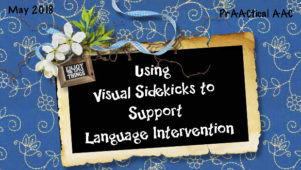
SLPs Lori Sanzeri and Chelsea Collins, creators of Core City, are back to share ideas for implementing AAC in the classroom. Today, they share their experiences in using visual supports as a supplemental strategy for their students who are beginning to use AAC. Enjoy! ::::::::::::::::::::::::::::::::::::::::::::::::::::::::::::::::::: Using Visual Sidekicks to Support Language Intervention Have you ever tried to read a book to your students without providing any visual supports? Do you find yourself having difficulty thinking about what questions to ask? Do you ever feel like the story is too “wordy” or difficult for your students to understand? Have no fear, Visual Sidekicks are here! Visual Sidekicks provide a color-coded communication board of target core and fringe vocabulary along with sentences of 3-5 symbols that simplify the text throughout the story. Children with special needs often demonstrate difficulties during structured literacy activities in the following areas: attending to... [Read More...]
May 6, 2018
by Carole Zangari -
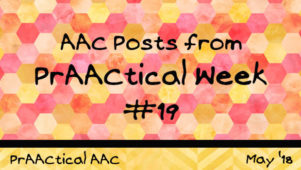
Hello, May – you sure are keeping us busy! I hope your week was a little saner than mine. In case you missed them, here are some of last week’s posts. Monday – On the Same Page: Helping Team Members Recognize and Respond to Unconventional Communication Signals Tuesday – AAC Link Up Wednesday – Video of the Week: iPad Apps for Learners with Complex Needs Thursday – AAC Assessment Corner with Vicki Clarke: Evaluating Skills for Use of Comprehensive AAC Dynamic Display SGDs ::::::::::::::::::::::::::::::::::::::::::::::::::::::::::::::::::::::::::::::::::::::::::::::::::::::::::: And if you have a bit more time, take a look at some of our previous posts. Saying ‘I love you’ on Mother’s Day AAC Immersion – Happy Mother’s Day! PrAACtically Reading with Karen Natoci: Are You My Mother? From ‘No AAC’ to ‘AAC All Day, Every Day!’ Autism and AAC: 5 Things I Wish I Had Known ::::::::::::::::::::::::::::::::::::::::::::::::::::::::::::::::::::::::::::::::::::::::::::::::::::::::::: Check out these resources for Better Hearing and Speech Month.... [Read More...]
April 8, 2018
by Carole Zangari -
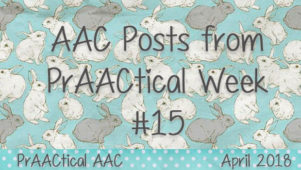
Spring is springing in our part of the world, bringing inspiration for new beginnings and the possibilities of rebirth. Here are some of the posts we shared in our prAACtical week. Monday – April Is Autism Awareness, Acceptance, and Appreciation Month Tuesday – AAC Link Up (Check out the things people shared here if you get a chance.) Wednesday – Video of the Week: AT in the IEP Thursday – 5 Ways to Promote Generalization of AAC Use ::::::::::::::::::::::::::::::::::::::::::::::::::::::::::::::::::::::::::::::::::: Inspired to read and learn more about the complexities of autism? Here are some posts that may be of interest. Sensory Interventions for Students with ASD: What Does the Research Say? Communication Supports for Problem Behavior with Dr. Pat Mirenda SGDs for People with ASD Narrative Skills in Students with ASD Friendship Skills for People with ASD who Use AAC And don’t forget to check out Lauren Ender’s materials for discounts on AAC and literacy apps... [Read More...]
April 5, 2018
by Carole Zangari -

Do you work with AAC learners who demonstrate their communication skills in therapy or instructional lessons, but not elsewhere? In this post, we review some things we can do to make it easier for AAC learners to generalize their newly-developed skills and use them in a variety of places with a range of communication partners. Part of the solution to this problem lies in collaborating with the communication partners in other settings. In doing that, we want to be sure that the partners use good communication facilitation strategies, such as these. Partner skills are something we’ve covered here on several occasions. Today, we’ll focus on changes we can make within our direct intervention or instructional lessons with AAC learners. Initially, we may control some of the instructional variables, such as materials and cues, rather tightly. Keeping things consistent is great for the initial teaching of new skills because it allows... [Read More...]









